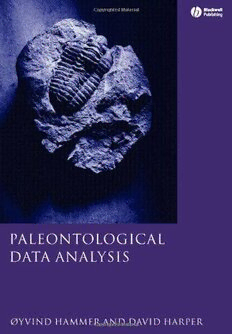
Paleontological Data Analysis PDF
370 Pages·2005·5.081 MB·English
Most books are stored in the elastic cloud where traffic is expensive. For this reason, we have a limit on daily download.
Preview Paleontological Data Analysis
Description:
During the last 10 years numerical methods have begun to dominate paleontology. These methods now reach far beyond the fields of morphological and phylogenetic analyses to embrace biostratigraphy, paleobiogeography, and paleoecology. The availability of cheap computing power, together with a wide range of software products, have made increasingly complex algorithms accessible to the vast majority of paleontologists. Paleontological Data Analysis explains the key numerical techniques in paleontology, and the methodologies employed in the software packages now available. Following an introduction to numerical methodologies in paleontology, and to univariate and multivariate techniques (including inferential testing), are chapters on morphometrics, phylogenetic analysis, paleobiogeography and paleoecology, time series analysis, and quantitative biostratigraphy. Each chapter describes a range of techniques in detail, with worked examples, illustrations, and appropriate case histories. The purpose, type of data required, functionality, and implementation of each technique are described, together with notes of caution where appropriate.Paleontological Data Analysis is an invaluable tool for all students and researchers involved in quantitative paleontology.
See more
The list of books you might like
Most books are stored in the elastic cloud where traffic is expensive. For this reason, we have a limit on daily download.
